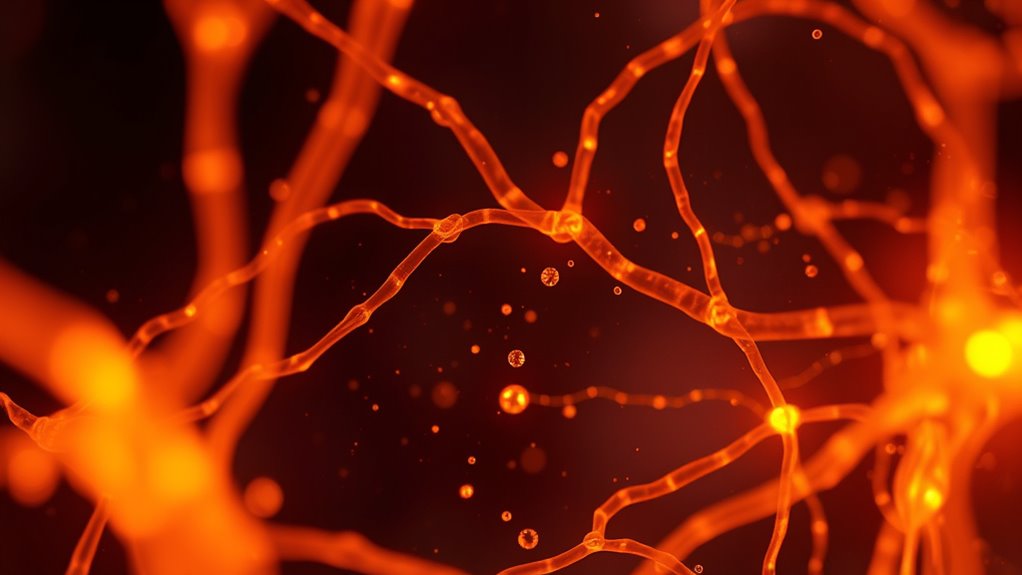Circadian rhythms influence much more than sleep; they control your hormones and metabolism, impacting your overall health. You’ll notice your cortisol peaking in the morning to keep you alert, while melatonin rises at night to help you sleep. These cycles also regulate hunger hormones like ghrelin and leptin, affecting how hungry or full you feel. Disrupting these patterns can lead to issues like weight gain, fatigue, and health problems—discover how maintaining your internal clock supports your well-being.
Key Takeaways
- Circadian rhythms regulate hormone secretion like cortisol and melatonin, influencing alertness and sleep-wake cycles.
- Hormonal fluctuations, such as ghrelin and leptin, align with circadian patterns to control hunger and satiety.
- Metabolic processes, including glucose metabolism and energy conservation, follow daily circadian cycles for optimal function.
- Disrupting circadian cues can impair hormonal balance, leading to insulin resistance, weight gain, and metabolic disorders.
- Proper alignment of circadian rhythms supports overall health, reducing risks of obesity, diabetes, and cardiovascular diseases.

Circadian rhythms, often associated with sleep-wake cycles, actually influence many aspects of your health and daily functioning beyond just when you sleep and wake. These internal timekeeping mechanisms help your body stay synchronized with the 24-hour day, guiding processes like hormone production, metabolism, and energy use. When your circadian rhythms are aligned, your body functions efficiently, but disruptions can lead to health issues.
At their core, circadian rhythms act as the body’s natural clock, regulating when certain hormones are released and how your metabolism operates throughout the day. For example, your body’s production of cortisol, a hormone that helps you wake up and stay alert, peaks in the morning. As the day progresses, cortisol levels decline, and melatonin levels rise in the evening, preparing you for sleep. This rhythmic hormone secretion is essential for maintaining balance and ensuring your body responds appropriately to environmental cues like light and darkness.
These rhythms serve as crucial timekeeping mechanisms, orchestrating metabolic regulation to optimize energy use and storage. During daylight hours, your body ramps up processes like glucose metabolism, making energy readily available for activity and alertness. As night falls, your body shifts gears, slowing metabolic processes to conserve energy and facilitate repair during sleep. Disrupting this cycle—such as staying awake late or eating irregularly—can throw off these timekeeping mechanisms, leading to issues like insulin resistance or weight gain.
Hormones linked to circadian rhythms don’t just influence when you sleep—they also impact hunger and digestion. Ghrelin, the hunger hormone, tends to rise before mealtimes, aligning with your body’s anticipation of food intake. Conversely, leptin, which signals fullness, fluctuates throughout the day to regulate appetite. When your circadian rhythms are out of sync, these hormonal signals become misaligned, causing increased hunger at inappropriate times or difficulty feeling satisfied, which can contribute to overeating and metabolic disturbances.
Your body’s ability to coordinate these processes depends on a finely tuned internal clock. Light exposure, meal timing, and activity levels all help reinforce your circadian rhythms, ensuring your hormonal and metabolic functions stay synchronized. Emerging research suggests that light exposure plays a particularly significant role in maintaining circadian health by regulating melatonin production. Neglecting these cues, such as irregular sleep patterns or late-night eating, can impair metabolic regulation and disturb hormone balance. This disruption not only affects your energy levels but also raises the risk of metabolic conditions like obesity, diabetes, and cardiovascular disease.
In short, circadian rhythms are fundamental to more than just sleep—they’re the backbone of your body’s internal timekeeping and metabolic regulation systems. When you respect and support these natural cycles, you promote overall health, energy, and well-being.
Frequently Asked Questions
How Do Circadian Rhythms Influence Athletic Performance?
Your circadian rhythms profoundly influence athletic performance by affecting your energy levels, strength, and reaction times throughout the day. By aligning your training timing with your body’s natural peaks, you can optimize performance and recovery. Understanding these rhythms helps you plan performance optimization strategies, ensuring you train when your body is most alert and capable. This approach allows you to maximize gains, reduce injury risk, and enhance overall athletic outcomes.
Can Disruptors Like Artificial Light Affect Hormonal Balance?
You’re playing with fire if you ignore how artificial light messes with your hormones. Light pollution, especially at night, suppresses melatonin production, which throws your hormonal balance off-kilter. This disruption can affect your sleep, metabolism, and overall health. So, it’s wise to limit exposure to screens and bright lights before bed. Your body’s natural rhythm depends on it, and keeping it in sync helps you stay on top of your game.
What Role Do Circadian Rhythms Play in Appetite Regulation?
You might not realize it, but your circadian rhythms profoundly influence appetite regulation. They control meal timing and cause hormonal fluctuations, like ghrelin and leptin, which signal hunger and fullness. When your rhythms are disrupted, perhaps by irregular sleep or artificial light, these hormones become imbalanced, leading to increased hunger and cravings. Staying consistent with sleep and meal schedules helps keep these hormonal signals aligned, supporting healthy appetite control.
Are There Genetic Variations in Circadian Rhythm Patterns?
You might have genetic predispositions that influence your circadian rhythm patterns. These genetic variations contribute to chronotype differences, affecting whether you’re a morning or evening person. Your genes help determine your internal clock, impacting sleep-wake cycles and other daily behaviors. Understanding these variations can help you optimize your lifestyle, aligning activities with your natural rhythms for better health and well-being.
How Do Circadian Rhythms Impact Mental Health Disorders?
Imagine your mind as a finely tuned orchestra, where circadian rhythms are the conductor. They influence mood regulation by coordinating hormonal fluctuations, ensuring emotional balance. When these rhythms are disrupted, it’s like a missed beat—leading to mental health challenges like depression or anxiety. You can feel this imbalance in your daily life, highlighting how essential synchronized rhythms are for maintaining mental stability and overall well-being.
Conclusion
You now see how circadian rhythms do more than just govern sleep—they’re the secret master switch controlling your hormones and metabolism. Ignoring these rhythms is like trying to navigate a spaceship blindfolded; you risk throwing your health into chaos. By aligning your daily activities with your body’s natural clock, you *disclose* the incredible power to optimize your well-being. Don’t underestimate this biological rhythm—it’s the tiniest clock that holds the key to your entire health universe.









